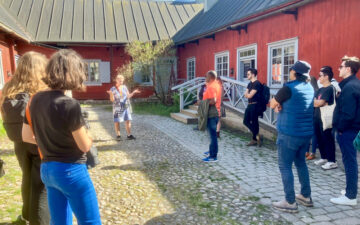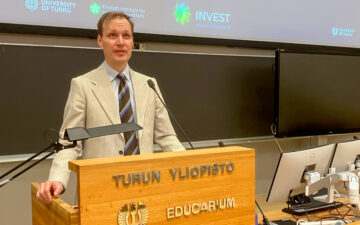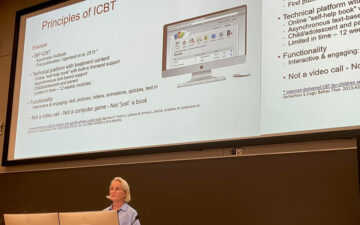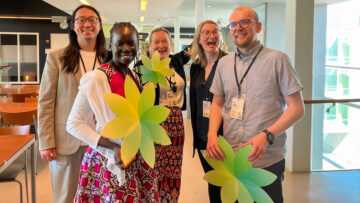Previous Conferences
INVEST Conference 2025: Uncertainty and Resilience in Changing Societies
Uncertainty and Resilience in Changing Societies
14–16 May 2025 Turku, Finland
The world is in turbulence. These rapidly changing times of uncertainty challenge societies to adapt to adversity and austerity. The climate crisis, economic uncertainty, drastic demographic changes, growing inequalities, and ongoing conflicts demand new solutions and interventions from grassroots to institutions to enhance well-being.
The INVEST Conference is an interdisciplinary, international and high-level scientific conference. Bringing together researchers from different countries and disciplines, it is an excellent opportunity for scholars and professionals to learn about research in the field, expand their networks, deepen their knowledge and create new opportunities for collaboration.
The INVEST conference 2025 invites scholars to come together to discuss how to strengthen resilience in changing societies.
Our keynote speakers

and over 100 presentations in parallel sessions!
Conference Program
Wednesday 14th of May
- 8.30–17.00 Pre-conference: Open Science & Impact Festival. Visitor and Innovation Centre Joki (Lemminkäisenkatu 12b) Please note that the pre-conference has its own, we will add the link 24 March.
- 16.30–17.30 Social program: Aboa Vetus Ars Nova (Itäinen Rantakatu 4)
- 18.00– Welcome Reception at the evening (Educarium, Assistentinkatu 5)
Thursday 15th of May
9.00–17.45 Conference venue (Educarium, Assistentinkatu 5, University of Turku)
- 9.00 Registration (open throughout the day)
- 9.00 Coffee and tea
- 10.00 Opening words, Jani Erola, Professor of Sociology at the University of Turku and the director of INVEST Research Flagship Center
- 10.30 Keynote Mary Daly, Professor of Sociology and Social Policy at the Department and a Fellow of Green Templeton College
- 11.30 Lunch break
- 12.30 Parallel sessions
- 14.00 Coffee and tea with something sweet
- 14.30 Parallel sessions
- 16.00 Coffee and tea available to grab
- 16.15–17.45 Parallel sessions
19.00–23.00 Dinner and evening party at Restaurant Grädda (Piispankatu 15)
Friday 16th of May
9.00–15.15 Conference venue (Educarium, Assistentinkatu 5, University of Turku)
- 9.00 Registration (open throughout the day)
- 9.00 Coffee and tea
- 10.00 Keynote Michael Ungar, founder and Director of the Resilience Research Centre at Dalhousie University
- 11.15 Parallel sessions
- 12.45 Lunch break
- 13.45–15.15 Parallel Sessions
- 14.30 Coffee and tea available to grab
- 15.15 Conference closes
The titles of the sessions:
The parallel session themes are built based on the abstracts.
- Social Well-being and Quality of Life
- Migration and Integration
- Research on crises and disasters
- Labour markets and economic well-being
- Citizenship and resilience
- Democraphic research
- Social experiments and interventions
- Methodologigal approaches and openings
- Mental Health & Mental disorders
- Peer relations and youth vulnerabilities
- Public health & social care
- Social Inequality
- NordForsk Session
>> Detailed programme wioth parallel sessions
>> Abstract book
Keynote speakers
Mary Daly: Resilience and Comparative Welfare State Analysis: Is it the Big New Idea in Social Policy
Resilience is widely promoted today, applied to many different fields and problems. Among the reasons for its popularity are that it picks up on growing insecurity and lack of certainty as a feature of modern-day living. Crisis and shock are core notions in the concept as is agency. Social policy is one of the fields that resilience has not (yet) been widely applied to. This keynote takes up the question of whether and how the concept can be used to better understand, and even champion, welfare state development. It will address three main questions: To what issues does resilience direct our attention and how does it compare to existing ‘big’ ideas in the field (e.g. social investment)? What is its potential as a lens for policy analysis? What might a social policy model inspired by resilience look like?
Our keynote speaker on Thursday, 15 May, is Mary Daly. She holds the Chair in Sociology and Social Policy based at the Department of Social Policy and Intervention at the University of Oxford. She is a Governing Body Fellow of Green Templeton College Oxford and a member of the British Academy as well as the Academy of Social Sciences. Most of her work is comparative, in a European and international context. Substantively, she is interested in and has published widely on the following social policy areas:
- long-term care and care for children;
- gender inequality;
- family policy;
- poverty and welfare state reform.
Mary Daly’s research has been supported by, among others, the Economic and Social Research Council, Horizon Europe, ILO, Council of Europe, UNWomen and UNICEF. Her current research focuses on the concept of resilience and whether and how it can be applied to families. This research is being carried out under the sic-country rEUsilience project.
Michael Ungar: Nurturing Resilience During Uncertain Times: The Many Ways Families, Mental Health Services and Communities Help Children Thrive
Globally, the way resilience is understood is shifting from individual responsibility for mental health to a definition of resilience that emphasizes the need for biological, psychological, social, institutional and ecological factors to work together to make the experience of resilience possible. In this presentation, Dr. Ungar will explain how multiple systems, from families to healthcare, can nurture resilience of child populations experiencing adversity by accounting for the complex multisystemic interactions that predict which children will do well despite the seriousness of the challenges they face. Using case examples of children, youth and families that have been exposed to high levels of adversity such as family violence, mental illness of a child or caregiver, natural disasters, forced migration, poverty, racism and other types of social marginalization and political conflict, Dr. Ungar will show how we can assess childhood resilience in a contextually sensitive, culturally relevant way and use that assessment to guide practice and policy. Seven factors common to children around the world who cope well under adversity and avoid problems like depression, PTSD, and delinquency will be discussed, along with strategies to change the social and physical environments that surround them.
Our keynote speaker on Friday, 16 May, is the founder and Director of the Resilience Research Centre at Dalhousie University, Michael Ungar.
In 2022, Dr. Ungar was ranked the number one social work scholar in the world in recognition of his ground-breaking work as a family therapist and resilience researcher.
INVEST Conference 2024: Digitalization, social inequality and behavioural change
Wednesday 15 May

Turku city walk tour
Welcome reception
Thursday 16 May
Opening words: Jani Erola, Flagship captain
Open Science: We need each other! Lydia Laninga-Wijnen, Senior Research Fellow, INVEST Research Flagship Centre, Open Science Turku Community coordinator
Keynote: Welfare and education in the age of cloud empires
Vili Lehdonvirta
Professor of Economic Sociology and Digital Social Research at the Oxford Internet Institute, University of Oxford

Lunch
Parallel sessions 1–5
- Youth disadvantages
- Work and care arrangements
- Equity, ethics and employment in digital technology
- Migration and migrant population
- Interventions
Coffee break
Parallel sessions 6–10
- Parenting and child well-being
- Social experiments I
- Social inequalities and standard of living
- Social welfare system and policy research
- Inequality in learning
Coffee break
Parallel sessions 11–15
- Open science
- Digital interventions and mental health
- Impacts of economic and educational contraction
- Family background effects
- Social aspects of digital technology
Dinner
After Science
Friday 17 May
Keynote: Digital treaments for pediatric anxiety disorders: Current status and future directions
Eva Serlachius
Adjunct Professor of Child and Adolescent Psychiatry, Karolinska Institutet

Parallel sessions 16–19
- Family formation: antecedents and consequences
- Register-based research in health
- Social experiments II
- Stress and health
Coffee break
Parallel sessions 20–24
- Cross-cultural research on mental health
- Genetics
- Peer relations
- Covid-19 and wellbeing
- Parental Leave and Work-Family Dynamics


